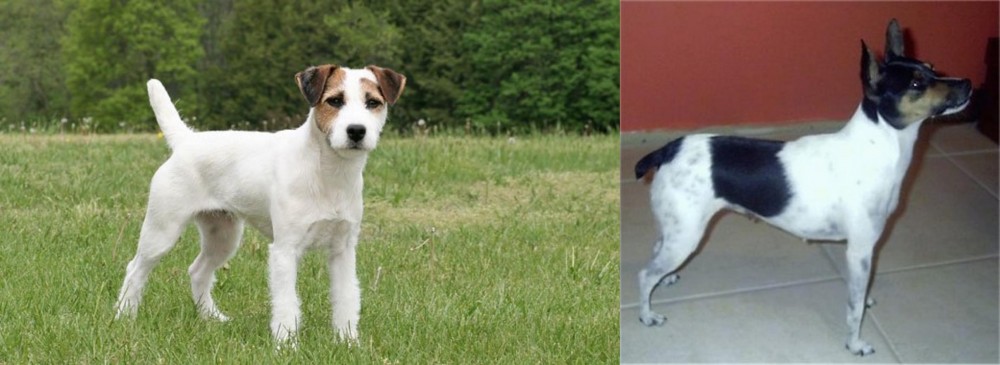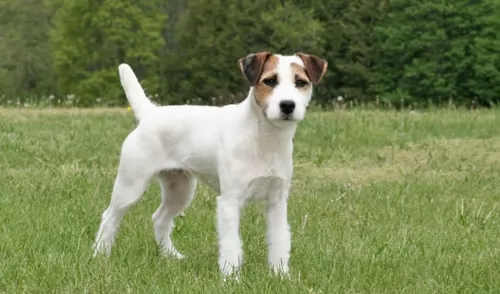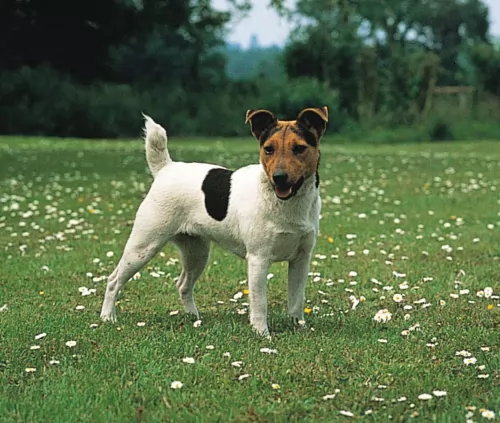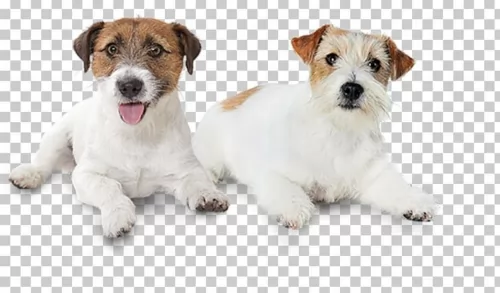 Petzlover
Petzlover Jack Russell Terrier is originated from United Kingdom but Miniature Fox Terrier is originated from Australia. Jack Russell Terrier may grow 8 cm / 4 inches higher than Miniature Fox Terrier. Both Jack Russell Terrier and Miniature Fox Terrier are having almost same weight. Both Jack Russell Terrier and Miniature Fox Terrier has almost same life span. Jack Russell Terrier may have more litter size than Miniature Fox Terrier. Both Jack Russell Terrier and Miniature Fox Terrier requires Low Maintenance.
Jack Russell Terrier is originated from United Kingdom but Miniature Fox Terrier is originated from Australia. Jack Russell Terrier may grow 8 cm / 4 inches higher than Miniature Fox Terrier. Both Jack Russell Terrier and Miniature Fox Terrier are having almost same weight. Both Jack Russell Terrier and Miniature Fox Terrier has almost same life span. Jack Russell Terrier may have more litter size than Miniature Fox Terrier. Both Jack Russell Terrier and Miniature Fox Terrier requires Low Maintenance.
 The popular Jack Russell Terrier was developed in Devonshire in the south of England in the late 1800's so as to hunt foxes.
The popular Jack Russell Terrier was developed in Devonshire in the south of England in the late 1800's so as to hunt foxes.
Often believed to be the Parson Russell Terrier, the Jack Russell Terrier was developed by Parson John Russell. This is where the dog gets his breed name from. Some people get the Jack Russell Terrier a little bit mixed up with the Parson Russell terrier, when it fact its actually a different breed, but sharing a common ancestry.
The Jack Russell Terrier is smaller than the Parson and bigger than the Russell Terrier. The breed became known in the U.S. by the 1930s and the Jack Russell Terrier Association of America wanted recognition by the American Kennel Club, which was granted in 2000.
 Known as Mini Foxies or Toy Fox Terriers, these dogs hail from Australia, having been bred there since the 1800s already.
Known as Mini Foxies or Toy Fox Terriers, these dogs hail from Australia, having been bred there since the 1800s already.
They are descendants of fox terrier types which were bred in England and then brought to Australia by early settlers.
It is believed the small Smooth Fox Terriers were crossed with Manchester Terriers and then the puppies further bred and crossed with other small breeds. The idea was to have a small, light, quick dog. The Miniature Fox Terrier is exactly like this, developed as a hunting dog.
 The Jack Russell Terrier is a small dog that weighs between 6 and 8kg and stands at between 25 – 38cm. The body length of the dog should be in proportion to the height.
The Jack Russell Terrier is a small dog that weighs between 6 and 8kg and stands at between 25 – 38cm. The body length of the dog should be in proportion to the height.
He is essentially a white dog with orange or fawn colored patches. The coat is mostly smooth and short, but the coat can also be longer and rough or it can be broken which is a combination of rough and smooth. Regardless of coat type, they are dense, double coats which will require brushing at least twice a week to remove loose hairs. He may also be tri-colored such as being white with black and tan patches.
He has alert, bright dark brown eyes and ears which are somewhat erect and which flop over at the tips. The tail has always been traditionally docked, giving him an attractive, compact look about him but unfortunately the tail is often left long on the dog these days.
Your Jack Russell Terrier is a lively, tenacious, bold, fearless, feisty, cheeky, confident, independent, intelligent and full of life dog. He is super energetic and exuberant, spirited and full of personality.
There are some dog owners who are exhausted by him and would prefer a more quieter dog breed as their companion. Nonetheless he has some excellent characteristics such as being a totally devoted and loving dog.
It is why it is a good idea to have him trained and socialized as it calms him down and makes him more obedient. He is very intelligent and training him will be easy.
 With longevity on his side, the Miniature Fox Terrier can live to be between 10 and 14 years of age or live to be even older - up to 18 years of age.
With longevity on his side, the Miniature Fox Terrier can live to be between 10 and 14 years of age or live to be even older - up to 18 years of age.
He stands at between 24 – 30cm and weighs anything between 3 and 6kg. His coat is short but he sheds quite a bit so regular brushing will become necessary.
The coat is smooth and is mostly white and tan or white and black but it can be tri-colored too – white, black and tan.
The ears are semi-erect, semi floppy and he has a bright, expectant look about him. The tail has always been traditionally docked, giving him a distinctive look, but now it tends to be undocked.
Your Miniature Fox Terrier is a bold little dog, and is protective and loyal towards his human family. He is lively and courageous and has lots of energy so he will be wanting lots of games indoors and out. He will love to go on a walk every day.
They make great family pets, getting on well with children and other pets in the home. They’re adaptable and can do well in the city or the countryside.
 With loads of vibrant personality, the energetic Jack Russell Terrier has got so many wonderful characteristics to his name – devotion, intelligence, charming, lively, playful and he is an entertainer – you’ll always be laughing a him.
With loads of vibrant personality, the energetic Jack Russell Terrier has got so many wonderful characteristics to his name – devotion, intelligence, charming, lively, playful and he is an entertainer – you’ll always be laughing a him.
You do need to pay him attention – you can’t just plonk him in your backyard and forget about him. He wants your love and attention and ignoring him can lead to problem behavior such as obsessive barking.
Give your Jack Russell Terrier all the love and care he needs, and you’ll have an exceptional pet and friend.
 Miniature Fox Terriers aren’t going to disappoint you one bit in terms of making an excellent pet.They make great family pets. They are loyal companions and they also make great watchdogs, being able to adapt to life in the city as well as the countryside.
Miniature Fox Terriers aren’t going to disappoint you one bit in terms of making an excellent pet.They make great family pets. They are loyal companions and they also make great watchdogs, being able to adapt to life in the city as well as the countryside.
They can yap quite loudly so you need to be careful of this if you live in a small property in the city.
This is such a jaunty little dog, full of fun and high spirits. You won’t know a dull moment with such a friendly, entertaining little pet. In exchange for all he offers you in terms of friendship, he also wants your love and attention.
Provide him with good food, a good deal of exercise, a dry, warm place to sleep and your ongoing attention and he is going to shower you with his love and loyalty.
 This particular dog breed has a reputation for being healthy and living to a good age such as 16 or 17 years of age. Of course he needs to be given proper care to reach such a good age.
This particular dog breed has a reputation for being healthy and living to a good age such as 16 or 17 years of age. Of course he needs to be given proper care to reach such a good age.
Some common dog disorders you might want to be aware of are -
Lens luxation is actually a common hereditary disorder in these dogs, but even so, with good care, your dog isn’t likely to battle with it. What happens is that the lens in the eye becomes displaced. There are two types, with Posterior luxation being the lesser severe one.Treatment is available.
Patellar luxation is an hereditary disorder affecting the knees of the dog. The kneecap slips off the groove where it sits and you may notice your dog running while holding his hind leg in the air. It can sometimes slip back in place and then you see your dog running in his usual way. It becomes more serious when it affects both legs.
 Your Miniature Fox Terrier can live to be between 10 and 14 years of age when looked after well, but there are one or two common dog illness that can plague any dog, and Paella Luxation is one.
Your Miniature Fox Terrier can live to be between 10 and 14 years of age when looked after well, but there are one or two common dog illness that can plague any dog, and Paella Luxation is one.
Patella luxation is fairly common with small dogs, occuring when the dog’s kneecap becomes dislocated from its thigh bone.Your dog will skip and hop along. Treatment for patella luxation can range from non-invasive treatments such as massage to surgery.
Dental health is important too, and seriously bad breath can be indicative of dental decay. Dental plaque can cause bad breath and lead to other health problems that aren’t directly related to teeth. The heart and kidneys can be put at risk. There are dental products such as canine toothbrush and toothpaste which can be used to clean your dog’s teeth. Don’t ever use human toothpaste as this can be toxic for your pet.
 The Jack Russell Terrier isn’t just a small dog that can be left to his own devices. He will need proper training and socialization early in life to make him obedient and better to get on with.
The Jack Russell Terrier isn’t just a small dog that can be left to his own devices. He will need proper training and socialization early in life to make him obedient and better to get on with.
He may be a small dog, but he certainly won’t do in the city where he is cooped up in a place with a handkerchief of a garden. He needs lots of space to run and play. He wants his human family to join in with walks, hikes, ball games and swimming.
You can buy excellent commercially manufactured dog food which caters for energetic small dog breeds like the Jack Russell Terrier.
Once you have selected the best one for your pet, with dry kibble being better in terms of dental health - you can also add in some brown rice, vegetables and cooked chicken. This is highly beneficial to all dog breeds. A little bit of raw meat can sometimes be added in too.
The bottom line is to to prevent your pet from eating foods high in preservatives, additives and fillers. Never leave your pet without a constant supply of fresh, cool water.
 Feed your terrier a quality commercially manufactured dog food twice a day. They are small dogs, but highly energetic so choose dog foods which are geared towards small, energetic dogs.
Feed your terrier a quality commercially manufactured dog food twice a day. They are small dogs, but highly energetic so choose dog foods which are geared towards small, energetic dogs.
His age and his activity levels will also give you an idea as to what to feed him. Apart from dry kibble, give him simple, tasty, nutritious home-made food too.Every now and again, add in boiled chicken, brown rice or pasta and some cooked vegetables such as potato, carrots and spinach. A little bit of raw meat occasionally can also do wonders.
Keep meals plain and simple like this to avoid stomach upsets.
Ensure your pet has constant access to fresh, cool water.
Brush him twice a week to keep the coat free of loose hair. Try and avoid bathing your pet as it causes dry skin and itchiness. Rather wipe him down with a rubber grooming mitt to keep him groomed.
Check his eyes and ears for infection. Check for fleas and ticks and any unusual lumps. Trim his nails too.
Take him to the vet when he appears to be ill and keep his vaccines up to date.